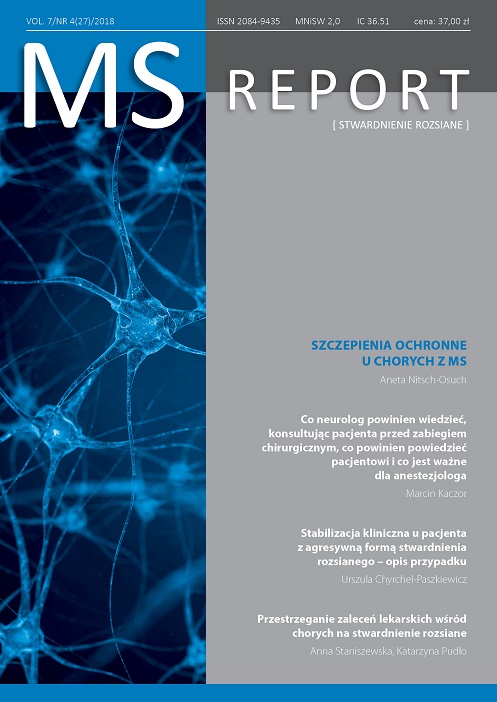Vaccinations in patients with MS Review article
Main Article Content
Abstract
Vaccinations are an effective method of preventing infectious diseases and can be performed in patients with MS, with some limitations. In patients receiving treatment in the injectable subcutaneous form (such as interferon or glatiramer acetate), the rules for vaccinations do not differ from those in the general population: both inactivated and live-attenuated vaccines are effective and safe. In patients who receive treatment in the intravenous or oral form (with an immunosuppressive effect), live attenuated vaccines are contraindicated while inactivated vaccines may be less effective. Vaccinations are contraindicated in the active phase of the disease, and should be delayed for 4–6 weeks after acute deterioration of the MS.
Article Details
Copyright © by Medical Education. All rights reserved.
References
2. Williamson E.M., Berger J.R.: Infection risk in patients on multiple sclerosis therapeutics. CNS Drugs 2015; 29: 229-244.
3. Keyser J., Zwanikken C., Boon M.: Effects of influenza vaccination and influenza illness on exacerbations in multiple sclerosis. J. Neurol. Sci. 1998; 159 (1): 51-53.
4. Mormile R.: Hepatitis B virus (HBV) infection and multiple sclerosis: one more reason to undergo vaccination? Immunol. Lett. 2015; 165(1): 60-61.
5. Langer-Gould A., Qian L., Tartof S.Y. et al.: Vaccines and the risk of multiple sclerosis and other central nervous system demyelinating diseases. JAMA Neurol. 2014; 71: 1506-1513.
6. DeStefano F., Verstraeten T., Chen R.T.: Hepatitis B vaccine and risk of multiple sclerosis. Expert Rev. Vaccines 2002; 1: 461-466.
7. Jefferson T., Heijbel H.: Demyelinating disease and hepatitis B vaccination: is there a link? Drug Saf. 2001; 24: 249-254.
8. Merelli E., Casoni F.: Prognostic factors in multiple sclerosis: role of intercurrent infections and vaccination against influenza and hepatitis B. Neurol. Sci. 2000; 21(supl. 2): s853-s856.
9. National Multiple Sclerosis Society. Vaccinations [online: nationalmssociety.org/]. Dostęp: 2.01.2019.
10. Confavreux C., Suissa S., Saddier P. et al.: Vaccines in multiple sclerosis study group: vaccinations and the risk of relapse in multiple sclerosis. N. Engl. J. Med. 2001; 344: 319-326.
11. World Health Organization (WHO). Yellow fever vaccination recommendations [online: who.int/ith/ith-country-list.pdf ]. Dostęp: 4.01.2019.
12. Charakterystyka produktu leczniczego Stamaril [online: pub.rejestrymedyczne.csioz.gov.pl]. Dostęp: 3.01.2001.
13. Farez M.F., Correale J.: Yellow fever vaccination and increased relapse rate in travelers with multiple sclerosis. Arch. Neurol. 2011; 68: 1267-1271.
14. Williamson E.M., Chahin S., Berger J.R.: Vaccines in multiple sclerosis. Current Neurology and Neuroscience Reports 2016; 16: 36.
15. Epstein D.J., Dunn J., Deresinski S.: Infectious complications of multiple sclerosis therapies: implications for screening, prophylaxis, and management. Open Forum Infect. Dis. 2018; 5(8): 174.
16. Zilber N., Kahana E.: Risk factors for multiple sclerosis: a case-control study in Israel. Acta Neurol. Scand. 1996; 119: 313-320.
17. Ristori G., Buzzi M.G., Sabatini U. et al.: Use of Bacille Calmette-Guerin (BCG) in multiple sclerosis. Neurology 1999; 53: 1588-1589.
18. Grimaldi-Bensouda L., Guillemot D., Godeau B.: Autoimmune disorders and quadrivalent human papillomavirus vaccination of young female subjects. J. Intern. Med. 2014; 275(4): 398-408.
19. Scheller N.M., Svanström H., Pasternak B.: Quadrivalent HPV vaccination and risk of multiple sclerosis and other demyelinating diseases of the central nervous system. JAMA 2015; 313(1): 54-61.
20. Metze C., Winkelmann A., Loebermann M. et al.: Immunogenicity and predictors of response to a single dose trivalent seasonal influenza vaccine in multiple sclerosis patients receiving disease-modifying therapies. CNS Neurosci. Ther. 2018. DOI: 10.1111/cns.13034.

